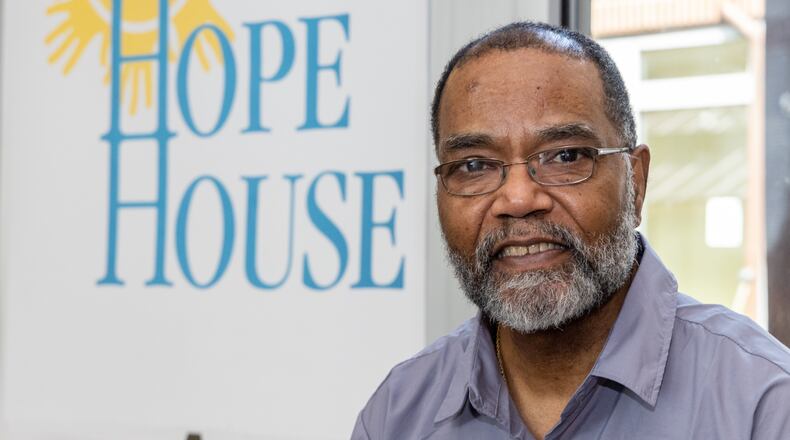Bradley Porter is living his best life, thanks to his oldest daughter and Atlanta’s Hope House treatment facility.
He’s clean and sober, as he always knew he could be with the right help, despite the challenges of being deaf and living in a world of silence since age 3.
Porter, 64, and his daughter, Ivy Porter-Henderson, 35, communicate with their hands and eyes. She learned American Sign Language as a small child because both parents are deaf, and an uncle, Porter’s twin brother Broderick, is also deaf.
Porter-Henderson’s parents divorced when she was young, and her mom moved with her and her little sister from Chicago to Mississippi. But she was always a daddy’s girl, and missed having him around for special moments while growing up.
“It’s great to have my dad back,” said Porter-Henderson, after recounting the circumstances that brought restoration.
In 2018, Porter, living in a Chicago homeless shelter, called his daughter, now living in Atlanta, and said he was ready for a change and asked for her help. Porter had been struggling with substance abuse for a while, and it wasn’t the first time he had reached out. Other family members had dismissed his pleas.
“But what resonated with me this time was that he was homeless, and I wanted to do whatever I could in my power to get him out of that situation,” Porter-Henderson said.
Her father had tried Chicago treatment programs multiple times without success, so she wanted to find something different that would meet his unique needs. A national search found Hope House, a treatment facility in her own backyard that offered care for deaf men experiencing homelessness.
As a service of the nonprofit CaringWorks, Hope House is a 70-bed residential facility in downtown Atlanta helping homeless men recovering from substance abuse. It also provides one of the country’s only Deaf or Hard of Hearing (DHH) homeless programs.
Because CaringWorks had successfully helped homeless men through addictions, the nonprofit was asked to include a treatment program specifically for those who are deaf. Deaf Bridges to Recovery is the only program of its kind in the Southeast, and one of only three nationwide.
“It kind of struck like a lightning bolt, because, in all honesty, it’s not something we thought specifically as a problem,” CaringWorks President and CEO Carol S. Collard remembered.
Credit: Phil Skinner
Credit: Phil Skinner
For the past decade, Hope House has dedicated 12 of its beds for homeless DHH adults. Deaf Bridges to Recovery program manager Kevin Henderson is also hard-of-hearing and understands the deaf culture. Henderson said while DHH clients have different needs from the others, the two groups have the same goal of recovery. Most clients graduate from Hope House recovery services in two years, though there are no set deadlines.
Having other interpreters on staff goes a long way toward recovery for DHH clients, Collard said.
“You know that you’re in a place where you feel safe, valued, and appreciated and get the help you need,” she said.
Porter was in the Deaf Bridges to Recovery program for two years, graduating in November.
“This is an amazing program,” he said through an interpreter. “I was really motivated, and I’m ready to move on with my life. After two years, I was able to see my life change.”
For new Hope House graduates who need extra support moving forward, CaringWorks now offers recovery housing in an apartment. This pilot program allows for stable housing while clients gradually gain independence, so they don’t go back to the streets or their old lifestyles, Collard said.
According to CaringWorks, at least 90% of Hope House clients are in stable housing one year after graduating. “For those who can get deep services, you can end the problem” of homelessness and addiction,” Collard said.
Credit: Phil Skinner
Credit: Phil Skinner
Porter still moving toward independence, living with his daughter and holding down a job. At his recovery graduation ceremony, he praised his daughter as the only person who would help him. Naturally, that meant a lot to Porter-Henderson.
“Now I see it’s an addiction,” she said. “It’s a disease, and it’s not something (my father) could help.”
“It’s been great to see him go through the program and complete it and work towards being a better man, not only for me but for himself,” she added, her voice breaking with emotion.
“I’m so proud of him; the words can’t really explain how proud I am of his journey. This journey has taught me so much about life, myself, empathy, forgiveness, and love.”
Credit: Phil Skinner
Credit: Phil Skinner
MORE DETAILS
In honor of upcoming Father’s Day, CaringWorks is seeking donations to help restore more fathers to their families. The funds will help Hope House treatment services.
To donate for Father’s Day campaign: www.caringworksinc.org/fathersday
About the Author
Keep Reading
The Latest
Featured




